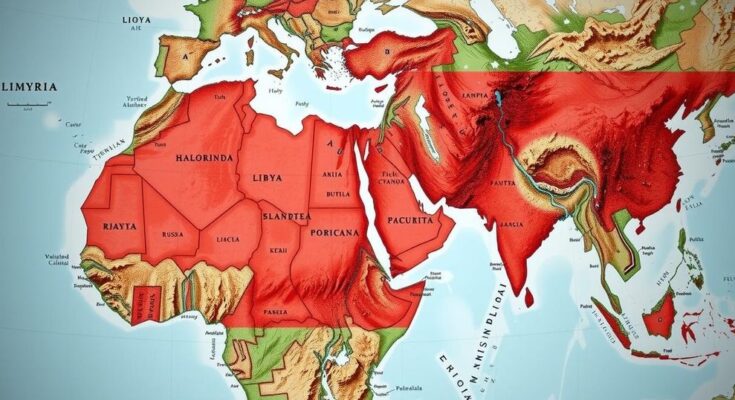Russia is shifting its focus from Syria to Libya as a primary foothold in Africa following the destabilizing shift in Syria’s leadership. With ongoing military support for Khalifa Haftar and enhanced military logistics, Russia aims to expand its regional influence amidst increasing geopolitical complexities.
Following the destabilization of Bashar al-Assad’s regime in Syria, Russia has begun to pivot its focus toward Libya as a critical strategic location in Africa. The Kremlin had previously established significant military footholds in Syria, utilizing facilities along the coast for operations across the Mediterranean and sub-Saharan Africa. However, with Assad’s exit, experts believe that Russia’s security infrastructure in Syria is under threat, prompting a strategic withdrawal to Libya, where Russian mercenaries are already backing Khalifa Haftar against the Tripoli-based Government of National Unity, recognized by the UN and supported by Turkey.
Research from the Swiss investigative consortium “All Eyes On Wagner” revealed that military resources have been actively redirected to Libya, with cargo ships allegedly transporting military equipment from Russia. The ongoing operations highlight Russia’s intent to maintain its influence in Africa while reducing its vulnerability in an unsettled Syrian landscape. Nevertheless, analysts caution that Libya presents more complex challenges than Syria due to heightened scrutiny and the presence of competing interests from other powers, including Turkey and various Western nations.
The potential deployment of advanced military systems, such as S-300 and S-400 anti-aircraft batteries, illustrates Russia’s commitment to bolstering its position in Libya. However, experts emphasize the importance of developing contingency plans and establishing alternative local alliances, as the Kremlin’s reliance on Haftar may limit its operational flexibility and access to resources. Overall, the shift in Russia’s strategy reflects broader ambitions to solidify its geopolitical presence across the African continent, facilitating a counterbalance to Western engagement and intervention in the region.
This analysis focuses on the growing importance of Libya in Russia’s strategic landscape following the weakening of its position in Syria after the fall of Bashar al-Assad. Since the civil unrest in Libya post-2011, the country’s fragmented political landscape has allowed foreign powers to influence affairs. Russia’s interests in Libya are linked to maintaining operational capabilities in Africa, particularly in the context of increasing complexities arising from the Syrian developments. The geopolitical implications of Russia’s involvement in Libya may affect the broader balance of power in North Africa and the engagement strategies of NATO and the EU.
In summary, Russia’s strategic pivot towards Libya signifies a shift in its military and geopolitical approach in response to the challenges it faces after the fall of the Assad regime in Syria. As it seeks to strengthen its foothold in Africa through support of local factions like Haftar, the Kremlin must navigate a more complex environment, contend with competing foreign interests, and ensure that it does not overextend itself as it strives to maintain influence in turbulent regions.
Original Source: www.france24.com




